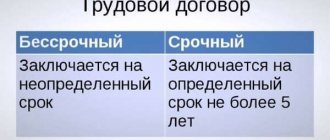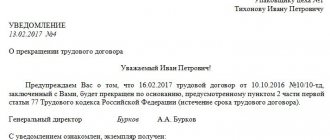The grounds for termination of an employment contract are:
1) agreement of the parties (Article 78
this Code);
2) expiration of the employment contract (Article 79
of this Code), except for cases where the employment relationship actually continues and neither party has demanded its termination;
3) termination of an employment contract at the initiative of the employee (Article 80
this Code);
4) termination of an employment contract at the initiative of the employer (Article 71
and
81
of this Code);
5) translation
an employee, at his request or with his consent, to work for another employer or transfer to an elective job (position);
6) an employee’s refusal to continue working in connection with a change in the owner of the organization’s property, a change in the jurisdiction (subordination) of the organization or its reorganization, or a change in the type of state or municipal institution (Article 75
this Code);
(as amended by the Federal Law
dated 04/02/2014 N 55-FZ)
7) the employee’s refusal to continue working due to a change in the terms of the employment contract determined by the parties (part four of Article 74
this Code);
 the employee’s refusal to transfer to another job, which is necessary for him in accordance with a medical certificate issued in the manner established by federal laws and other regulatory legal acts of the Russian Federation, or the employer does not have the corresponding job (part three
the employee’s refusal to transfer to another job, which is necessary for him in accordance with a medical certificate issued in the manner established by federal laws and other regulatory legal acts of the Russian Federation, or the employer does not have the corresponding job (part three
and
the fourth
of Article 73 of this Code);
9) the employee’s refusal to be transferred to work in another location
together with the employer (part one of
Article 72.1
of this Code);
10) circumstances beyond the control of the parties (Article 83
this Code);
11) violation of the rules for concluding an employment contract established by this Code or other federal law, if this violation excludes the possibility of continuing work (Article 84
of this Code).
(Part one as amended by the Federal Law
dated June 30, 2006 N 90-FZ)
An employment contract may be terminated on other grounds provided for by this Code and other federal laws.
Part three is no longer valid. - The federal law
dated June 30, 2006 N 90-FZ.
Termination of the contract at the will of the employee
Article 77, paragraph 3 of the Labor Code of the Russian Federation empowers anyone to terminate cooperation with a certain employer of their own free will. You can resign yourself at any time, regardless of the situation. It is enough to notify management of your dismissal 14 days before the date. A statement is written for this purpose. Two weeks after writing the application, the contract terminates, and the relations of the parties end according to Article 80 and paragraph 3 of Article 77 of the Labor Code of the Russian Federation. Employees have the opportunity to quit without having to work for two weeks, but the management of the organization must agree with this decision. Such dismissal is formalized differently - by agreement of the parties. If an employee leaves of his own free will, then he writes a statement 2 weeks in advance. Upon termination of the employment relationship, the manager is obliged to pay the employee - pay him in full, and compensate, if necessary, for unused vacation. And hand over your work book. Let's consider special circumstances that may arise when leaving of one's own free will within the framework of the norm of paragraph 3 of Article 77 of the Labor Code of the Russian Federation. There are often cases when employers force people to leave work on their own initiative, against their wishes. Such coercion is not acceptable by law. The resignation letter must be written voluntarily - this is important. An employee who was forced to leave his job by being forced to write a statement has the right to go to court. However, he will have to prove the fact of forced dismissal himself. Other exceptional situations also occur. For example, when the contract is terminated before 2 weeks have passed. This can happen in two cases:
- A citizen cannot continue to work for objective reasons. Such, for example, as retirement, admission to a university, change of place of residence due to the transfer of a spouse there to work or serve. The employee must be prepared to support such significant reasons with documents.
- The employer violated labor standards. rights or terms of the contract. If the employer's guilt in such violations is established by the court, labor. commission, trade union or control and supervision bodies, then the contract can be terminated within the period that the employee writes in his application.
There is another special situation, more precisely the employee’s right. He can cancel his application before the two weeks expire, and, if he takes a vacation with further dismissal, then before the start of the vacation. You can change your mind only if over the past few days a new employee has not been found for this position and has not been invited to it in writing. If there was no time to call a new employee, and the application is withdrawn, then the dismissal is considered invalid, and the labor relationship continues. So, Article 77, paragraph 3 of the Labor Code of the Russian Federation gives people the opportunity to terminate a contract with an organization on their own initiative. Dismissal under this article can only be a voluntary desire of the employee, and he can change his decision. Also, in exceptional situations, you can quit without having to work for two weeks.
Procedure in case the employer is against dismissal
There are situations when, due to a shortage of personnel or for some objective or subjective reasons, management does not agree with the resignation of an employee, preventing his attempts to submit an application. Such behavior by the employer is, of course, unlawful, but the employee may be confused, not understanding how to get out of this situation. Article 77 paragraph 3 of the Labor Code of the Russian Federation gives any employee the right to resign at will. No motives of the employer should influence the will of the citizen. It is necessary to formalize the dismissal correctly in accordance with the Labor Code of the Russian Federation, and then no actions (inaction) of the employer will allow the employee to stay at the place of work longer than necessary. This is the algorithm for an employee’s behavior if the employer interferes with his dismissal by rejecting the application. First, you need to send your resignation letter in such a way that the manager cannot avoid receiving it and certifying such receipt. This can be done in three ways, the features of each of which should be mentioned separately.
- The first method: to endorse the application at the secretariat or office of the organization, or another department that registers correspondence. It is important to keep a copy of the resignation letter, which should include the document number. There must also be the date, surname, initials, signature and position of the office employee who accepted this application. This method is the simplest for ordinary dismissal, and the most difficult if the employee is faced with obstacles when changing jobs.
- The second way: use postal delivery. You can send your resignation letter by registered mail or a letter with a declared value and an inventory of the attachment. Sending correspondence by mail must be registered, and the citizen also receives a receipt confirming the sending. In addition, you can send a letter with acknowledgment of receipt in order to know exactly when the employer received the application in hand and to have documentary evidence of this. The only nuance you need to know when sending an application by mail is that the manager will be officially notified of dismissal only the next day after receiving the letter. The two weeks that must be worked before dismissal will begin to be calculated only from the specified period. Therefore, when indicating the date of dismissal in the application, you must first check with the post office the date of delivery of the registered letter.
- Third way: send a telegram. This option is also possible, and, as you know, the delivery time for telegrams is much shorter than the delivery time for a letter. An urgent telegram is delivered in 4 hours, an ordinary telegram in 8 hours. The telegram must contain the full text of the statement. It is also advisable to obtain a copy of it for yourself with a shipping mark, date and seal.
Secondly, after sending the application using one of the indicated methods, it is necessary to continue working as before until the date written in the application, without disrupting work. discipline. On the last day of work, the manager is obliged to hand over the work book and make a cash payment. Afterwards, the employee may not go to work. If the manager refuses to hand over the work book and does not pay the employee, then he does not comply with the dismissal procedure established by law. Thus, he violates the employee’s right to voluntary dismissal, established in Article 77 p3 of the Labor Code of the Russian Federation. An employee can always appeal against actions or inactions of management if he believes that his rights have been violated. There is no reason in the law for an employer to refuse to resign an employee on his own. For refusal to accept an application (if the employee manages to prove the intentionality of the actions and the fact of the refusal itself), as well as for any violation of the law by establishing obstacles to the dismissal of an employee, a fine is provided (Article 5.27 of the Administrative Code). The employee has the right to submit:
- application to the workers' union;
- complaint to the Federal labor and employment service;
- a complaint to the prosecutor's office;
- lawsuit.
So, if the manager does not want the employee to quit and tries to prevent him from leaving the organization without accepting a resignation letter, competent actions will help the employee exercise his right (Article 77 p. 3 of the Labor Code of the Russian Federation) and resign on time. If the dismissal was not formalized within the required period, then in court you can recover moral damages from the employer, as well as oblige him to cover the expenses that resulted from the delay in dismissal. If the manager does not issue a work book, through the court you can recover an amount equal to the average earnings for each day of delay in issuance.
Is this procedure legal?
Any dismissal of an employee without explanation is impossible, since it is a direct violation of the law. Article 81 of the Labor Code of the Russian Federation provides a list of reasons why an employer has the right to terminate an employment relationship with an employee:
- closure of an organization;
- reduction of positions or number of employees;
- change of owner;
- failure to qualify for the position;
- ignoring or violating labor duties assigned to him under the contract;
- absenteeism without explanation;
- appearing at the workplace in an inadequate state - after taking drugs or alcohol;
- gross violations on the part of the employee - disclosure of secret information, theft of company property, violation of labor protection requirements, leading to death or injury.
Based on one of the reasons provided, the employer has the right to carry out the dismissal procedure. The lack of their argumentation during dismissal is a serious violation, therefore a person has the right to demand protection of his rights.
Dismissal in the absence of a written application
Clause 3 of Article 77 of the Labor Code of the Russian Federation allows dismissal from work on one’s own initiative only on the basis of a written application. The law is interpreted literally. Expert opinions coincide with conclusions based on judicial practice. Dismissal without a written statement is unlawful. With this development of events, paragraph 3 of Article 77 of the Labor Code of the Russian Federation and Article 80 of the Labor Code of the Russian Federation are violated. An employment contract can only be terminated by a written document submitted 2 weeks before the day of departure. As an example, consider one of the legal disputes. The employee demanded to be reinstated in his position, since he was dismissed on the grounds provided for in paragraph 3 of Article 77 of the Labor Code of the Russian Federation, but did not express his will in writing. In the course of clarifying the details of the case, it turned out that the statement was written on his behalf by another person. Since the handwriting examination confirmed that the employee dismissed at his own request did not in fact express such a desire, the court satisfied the claims and reinstated him in his position. So, if a person did not express his will by writing a letter of resignation, then the employer will not be able to fire him at his own request - the court will always side with the employee, obliging the management of the enterprise to reinstate the unfairly dismissed person at work.
Advice to the dismissing party
To avoid all sorts of troubles associated with the dismissal initiative, we recommend that you follow the following practice-tested rules.
- Accurately and strictly follow the dismissal procedure specific to each of the dismissal articles of the Labor Code of the Russian Federation:
- comply with prior notice periods;
- do not neglect written confirmation of the facts of misconduct;
- take care in a timely manner to ensure that the employee signs for review of all types of dismissal documentation, and in case of refusal to sign, to sign the relevant document;
- pay on time and in full the funds due to the employee upon leaving;
- promptly return his work book with records of dismissal made in accordance with the protocol.
- If possible, use the wording “at your own request” when leaving. If the dismissed person committed an offense, such a reason indicated in the documents will not cast a shadow on his future reputation. For the employer, the advantage of this article is this. That it cannot be used to challenge the dismissal in court.
- If it is important for the employer to document the employee’s guilt upon dismissal, he should strictly follow the letter of the Labor Code of the Russian Federation when registering the dismissal.
- If we consider the judicial practice on challenging the grounds for termination of employment relations, the most problematic for the employer are the following articles of dismissal:
- for disclosing secrets protected by law (clause B, clause 6, article 81 of the Labor Code);
- for a decision made by a managerial employee without justification, which resulted in a loss, unlawful use or violation of the safety of assets (clause 9 of Article 81 of the Labor Code).
These grounds may be subject to ambiguity, making it easier for the employee to prove wrongful dismissal. This creates additional problems for the employer, since in the event of an ambiguous interpretation, the court usually gives preference to the “weaker” party, that is, the staff representative.
Registration of dismissal by agreement of the parties
Clause 1 of Article 77 of the Labor Code of the Russian Federation allows for the completion of work. relations by mutual agreement between the parties. The contract is terminated at any time if the parties reach agreement. Such dismissal is usually formalized in a separate document, which is called a “termination agreement.” agreement." The Ministry of Labor clarifies that this agreement can be signed at any time before the day of termination of work. relationships. That is, there is no need to work for 2 weeks, as required by the rules when leaving work of your own free will. It is enough to put the date in the document - the last working day and state that the basis for termination is labor. a contract is an agreement between the parties. The agreement may also contain additional conditions: the amount of compensation to the employee upon dismissal, if provided; the possibility of taking leave before dismissal; the employee’s obligation to transfer work to his replacement and train him; and so on. The document is drawn up in two copies, one of which is taken by the employee. The second copy, signed by the parties, remains with the employer. It is worth mentioning the judicial practice regarding issues of dismissal by agreement. There are court decisions according to which, for dismissal under paragraph 1 of Article 77 of the Labor Code of the Russian Federation, mutual consent of the parties is sufficient, not necessarily supported by a written additional document. That is, the form of the agreement itself is not important. According to a number of judges, dismissal under paragraph 1 of Article 77 of the Labor Code of the Russian Federation will be lawful, even if the employee simply writes a letter of resignation by agreement of the parties, and the employer issues a corresponding dismissal order. An important feature of dismissal by agreement is that such an agreement cannot be canceled unilaterally. If the employee or employer changes their mind about their decision, then neither of them will be able to revoke the agreement. It can only be annulled by reaching mutual agreement. When trying to restore labor. relationship, one of the parties may send the other an application to cancel the termination agreement. The second party either agrees to the cancellation or gives a written reasoned refusal. Dismissal by agreement occurs on the basis of a standard order, which states that the employment relationship has been terminated on the basis of paragraph 1 of Article 77 of the Labor Code of the Russian Federation. The employee gets acquainted with the order against signature. If you refuse to sign an order, a note indicating such refusal is made on it. After making an entry about the end of work in the organization, the work book is issued to the employee also against signature (you need to sign on the personal card). The work book is stamped and signed. In case of such dismissal, wages are paid for the days of the month worked, material compensation for non-use of vacation and other amounts due, if they are provided for by labor or call. agreement.
Amicable dismissal: agreement of the parties
Quite often, in order to fire a weak employee who does not cope well with his duties, employers resort to the wording “dismissed by agreement of the parties.” This neutral designation allows you not to spoil the employee’s reputation for future employment and save the employer’s nerves. However, the agreement may be caused by other circumstances. However, regardless of the reason for dismissal by agreement, in this situation the following procedure should be followed:
- if the initiative was expressed by an employee , then he must notify his employer about this in writing, indicating the reasons for dismissal, as well as his requirements;
- if the employer acts as the initiator , then he is also obliged to inform the employee in writing about his intentions, citing the grounds and conditions, as well as the expected date of dismissal by agreement.
After informing the other party about the desire to terminate the employment relationship by consent, it is necessary to draw up the text of the agreement. It can be written in any form, but it must indicate the fact of voluntariness and reciprocity, as well as the conditions of dismissal and the date.
Dismissal due to changes in working conditions
One of the grounds on which employment can be terminated. agreement, the employee’s refusal to continue working under changed labor conditions is considered (Clause 7, Article 77 of the Labor Code of the Russian Federation). The organization may invite the employee to sign an agreement to change employment. agreement, which will contain information about new working conditions. Objectively, working conditions may change for organizational or technological reasons: production technology will change, structural reorganization will occur, etc. If such changes are coming at the enterprise, the employer is obliged to warn its employees about this 2 months before the introduction of new production conditions. Employees must be informed in writing. In the event of a general change in working conditions, the employer does not have the right to demand changes in labor. functions of individual employees, for example, changes in position or specialization. An employee may refuse to accept new working conditions. agreement. In this case, the employer provides the employee with another position corresponding to his qualifications or a less paid position. If the employee does not agree or there is no suitable position on staff, then the head of the company dismisses the employee under clause 7 of Article 77 of the Labor Code of the Russian Federation.
What does the law say about dismissal?
It is impossible to list all the possible reasons for ending a relationship with an employee; they are varied just like life itself. However, there are only a few legal grounds for dismissing an employee:
- if the employee expressed his own desire;
- at the initiative of the employer due to the poor quality of the work performed by the employee or the services provided to him, as well as due to the employee’s failure to comply with the labor discipline established within the company;
- on staff reduction;
- based on the results of certification, if the employee was unable to confirm his qualifications;
- by mutual agreement of the parties.
Let's look at these situations in more detail.
Is it possible to change the date of dismissal of an employee ?






